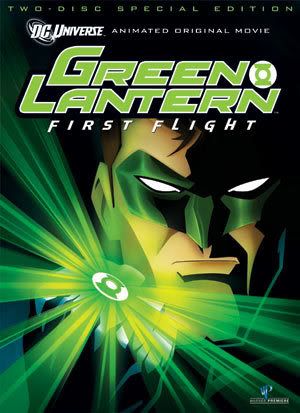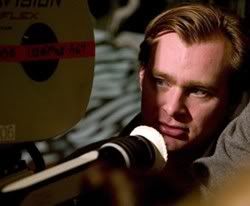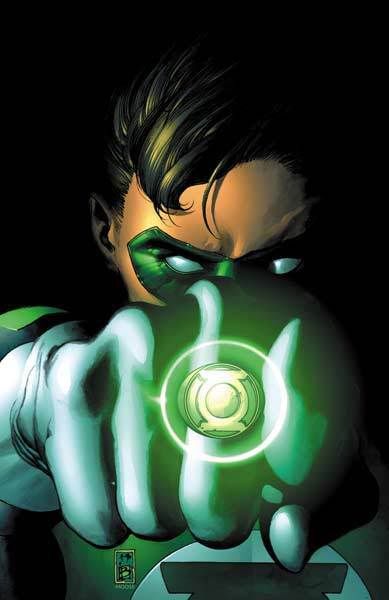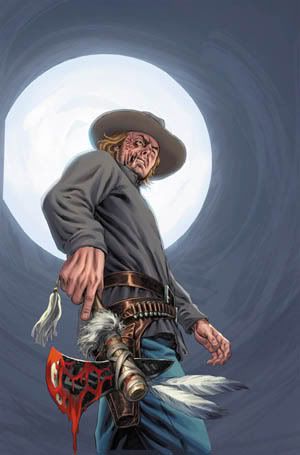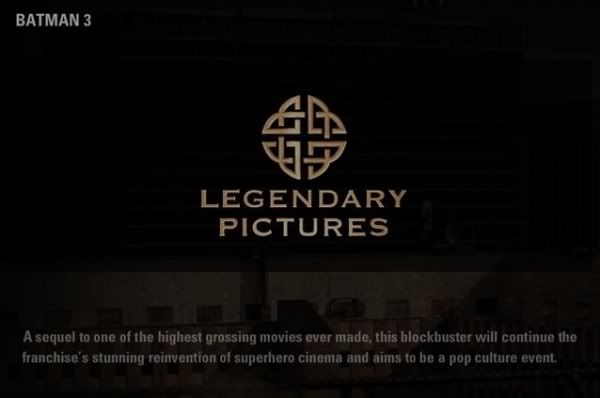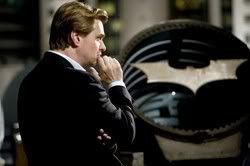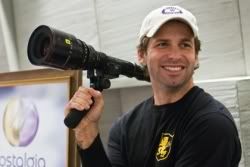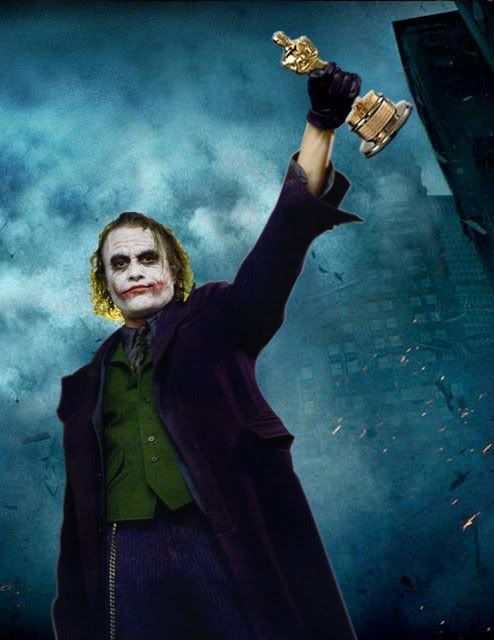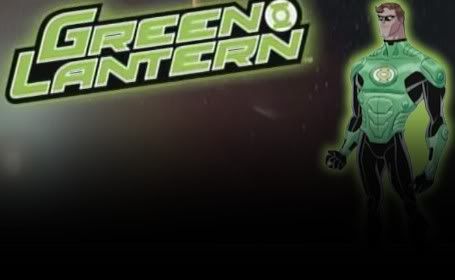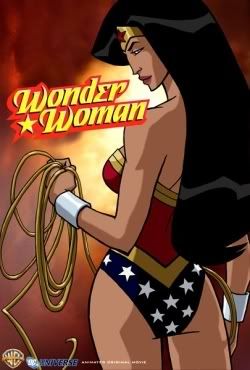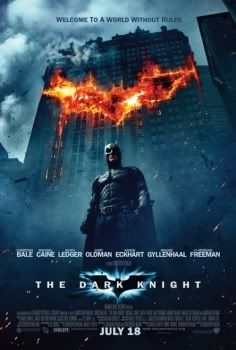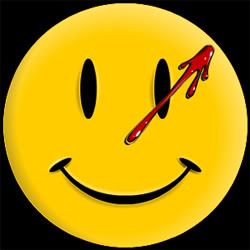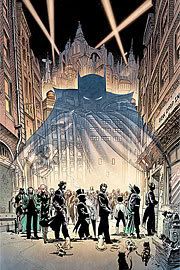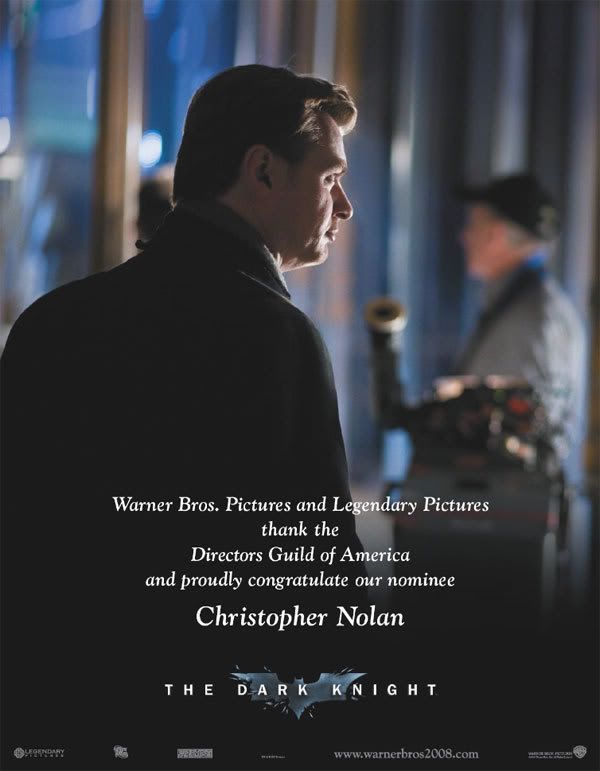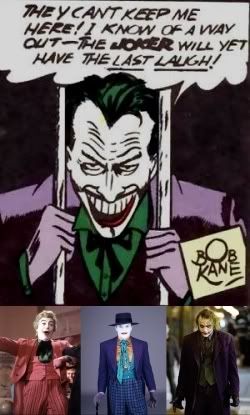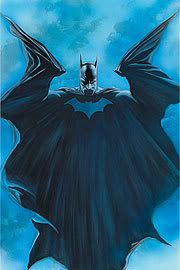free stats
At the end of Act I, Bruce Wayne, in his Batman persona, has snatched Mob banker Lau from Hong Kong and delivered him to Jim Gordon. He's done his job, justice has prevailed, the cops and the lawyers are united against the forces of the underworld and everything in perfect in Batworld.
But of course, it's not -- Lau's capture is only the beginning. Bruce, in his desire to upset the status quo and rewrite the rules of (out)law and (dis)order in Gotham City creates a wildly unstable new environment, and by the end of Act II, Bruce will be forced to abandon his Batman persona and sacrifice himself, yet again, for the city he loves -- that is, until Harvey Dent steals his thunder and turns, in the public eye, from White Knight to Dark Knight.
So: Lau is in custody, questioned by Rachel, with Harvey and Jim lurking in the background. This one thing right here, small as it seems, indicates for me how The Dark Knight earns its place at the top of the "superhero movie" pyramid: the Nolans figured out a way to get Jim Gordon, Harvey Dent and Rachel Dawes, Bruce's love interest and apex of the movie's romantic triangle, into the plot in a way that feels seamless and organic. Go through the list of superhero movies and list the number of love interests wholly peripheral to the story and you'll see the coup that the Nolans achieve here. Generally, the love interest exists outside of the protagonist's superhero world, which is why they end up as damsels in distress. Here, Rachel is part of Bruce's natural world of interests (she is a law enforcer, after all, she's almost Harvey Dent her own self -- and hey, wouldn't it have been awesome if it was Rachel instead of Harvey who ended up becoming Two-Face?) and works closely -- and professionally -- with his allies Jim and Harvey. Rachel manages to get what she needs from Lau in record time, sending him to jail -- but whose jail? Again, Jim and Harvey clash over issues of trust -- can anyone be trusted in Gotham City? It seems that the gangsters of Act I have a greater sense of trust and loyalty than the law-enforcement officers -- again, they are the establishment in Gotham. The fact that all the cops in Gotham are dirty means that the gangsters control the police department as well as the underworld. Harvey, Rachel and Jim (and their weapon, Bruce) are all alone in the city. When Batman acts to rid Gotham of gangsters, he's stages an assault on the very fabric of the city.
But Harvey is keen to pick up Batman's baton, and proceeds to use Lau's confession to round up, literally, every single gangster in Gotham City. (There was a commenter the other day who said that we never see how Harvey got his reputation as Gotham's White Knight -- well, we see him punch out a gangster on the witness stand, then arrest every gangster in the city -- how much more of a crusader could he be?
As Jim arrests Maroni, The Chechen and their goons, the crimelords come to see that the Joker is correct -- the Batman must be eliminated, at any cost. And so a Joker-led operation goes into effect -- the crimelords turn their resources over to a madman to expedite their agenda. "Kill the Batman" is not the end of the Joker's plan, but they don't know that.
Harvey meets up with the Mayor, to justify his crazy scheme to arrest every gangster in the city. It turns out, Harvey knows that his grand gesture is baseless and doomed to failure, but has a long-term political goal. And so he demonstrates that he is willing to appear to be foolish in order to achieve something bigger -- a notion which will echo throughout the rest of the narrative.
Harvey's meeting with the mayor is met with the Joker's first response to Bruce's plan of cleaning up Gotham as the dead "Hockey Pads" Batman appears outside the Mayor's window.
(Incidentally, where did the Joker get "Hockey Pads?" Was he still in police custody, or had he been freed on bail, and thence out into the world in his hockey pads again? Have these vigilantes no respect for the law, even after they're beaten up by Batman?)
Bruce, up until now under the impression that he had set everything straight in Gotham City, learns the news about Hockey Pads as he's getting ready for his party for Harvey Dent -- his ceremonial passing of the baton from Dark Knight to White Knight. "This is how crazy Batman's made Gotham" says the Joker, again, mixing lies with truth in order to elicit a response. Batman hasn't made Gotham crazy, he's cleaned up its streets in the space of a weekend. But, in so doing, he's created the crime vacuum that allows the Joker to flourish. Now, you'll notice that the Joker's plan has subtly changed from the meeting at the restaurant. His stated goal then was to "kill the Batman," but now he only wants to force Batman to reveal his identity. This might seem like a de-escalation, but it points to the Joker's larger goal, one that won't be fully revealed until the end of the narrative -- namely, that the Joker doesn't have a goal, doesn't have an endgame -- he wants only to have more and more chaos, murder and insanity in Gotham. Killing Batman solves the problems of the gangsters, but the Joker's vision of crime is much broader, and doesn't include the crimelords notions of respectability. Killing the Batman would restore Gotham to its status quo, but revealing the Batman would undermine everything in the city. This is why the Joker in The Dark Knight is such a great villain for Batman to go up against -- there is, literally, nothing Batman can do against him that does not further his agenda, even killing him.
(The Joker's videotape of his torture of Hockey Pads contains images of animal carcasses hanging from the ceiling. This is a visual nod to painter Francis Bacon, and the only link I can find back to the Joker in Tim Burton's Batman, who defaced every painting in the Gotham Museum of Art -- except for the Bacon.)
The party for Harvey begins. Bruce's plan is to ensure Harvey's security the same way he's ensured his own -- with tons of cash. Acknowledging who Harvey is inside, Bruce recognizes him as Daytime Batman and now seeks to turn him into exactly that. And, just so we know that his motives aren't entirely civic-minded, we learn that his plan to turn Harvey into Daytime Batman involves stealing Rachel away from him. That is, he's says "You want to be Batman? Great, be Batman -- oh, and by the way, that means you can't have a wife."
Meanwhile, the Joker's plan to unmask Batman proceeds apace. He kills, at once, the police commissioner and the judge trying the "all gangsters in Gotham" case, and will soon try to kill Harvey. This is good planning on the Joker's part -- by killing the judge and the commissioner, he both applies pressure on Batman to unmask and ensures that all the gangsters will go free -- no one will step forward to replace the judge -- and the crimelords can then reclaim their place as Gotham's true power base.
Back at the party, Harvey, feeling perhaps secure in his future, now that he's gotten the security of Bruce Wayne's rich friends, proposes to Rachel. Rachel, however, cannot accept -- she still loves Bruce on some level, even though his heart is something she can never really have, just as "justice" is something Bruce can never really have, it is only something he can endlessly pursue.
Suddenly, the Joker shows up at the party, in a rare moment of straightforwardness -- he wants to kill Harvey Dent, and so he shows up where Harvey Dent is to kill him. No brilliantly devious double-crossing scheme, just storming the penthouse and demanding the goods. Bruce responds by abducting Harvey and stashing him someplace safe (just like Bruce, in a crisis, to assume he knows what's best for everyone) and then heading off to his Bat-closet to prepare himself for his first confrontation with the Joker. (On the way he disarms a guy with a shotgun, then takes apart the gun without looking at it, a neat echo of a similar beat with Harvey in the courtroom.) The Joker menaces Rachel out in the living room, telling her the second version of his "scars" story. We will, of course, never know how the Joker got his scars, he most likely has an endless supply of stories to tell people. Wherever the Joker came from, whatever formed his psyche, however he came to his world-view, he is infinitely scarier if we're left in the dark. We can feel compassion for -- and even root for -- other Batman villains. Ras-Al-Ghul, the Penguin, Catwoman, Mr. Freeze, we can disapprove of their crimes but we can still kind of see why they are as they are. This is what has always made the Joker the most interesting and deathless Batman villain, the reason why, back in 1989, when people saw that Jack Nicholson was playing the Joker, everyone said "Well now -- that I have to see." Everyone understands that the Joker elicits a stronger response than any other Batman villain, even though they may not understand immediately why. (Wouldn't it be funny if it turned out that the Joker got his scars because his father offended a monarch.) Batman appears just in time to rescue Rachel from the Joker's threats, although he must dive out a window and make a rather improbable skydive to do so.
Across town at the MCU, Jim and one of his detectives, Stephens, rue their reversal of fortune -- in nothing flat, they have cleaned up the streets of Gotham and then, just as quickly, lost all the ground they had gained. The moment Stephens announces they've lost, Harvey, last seen being stuffed into a closet in Bruce's apartment, shows up, brass balls in place, to take Lau to court, as scheduled. (We don't know how long Harvey had to wait in the closet before the Joker gave up and went home -- a rare instance of a question unanswered in The Dark Knight. Once Bruce dives out the window to save Rachel, what does he do? Put her in a cab and walk back to his underground lair? Call Alfred on his cell phone and tell him to pick him up around the corner?)
Back at the lair, Bruce discusses the situation with Alfred, who provides some perspective on the whole Joker situation with his story about being a soldier in Rangoon. Alfred reminds Bruce that he created this situation when he decided to upset the status quo, and that if he's thinking of giving into the Joker's demands he'll just make everything worse. "We just need to figure out what he's after" says the World's Greatest Detective, proving that he is completely unequipped to deal with the Joker -- Bruce is a man of relentless, probing intelligence, and the Joker, he will eventually learn, isn't after anything that Bruce can understand.
That night, Batman stands atop a building with, apparently, some kind of sophisticated listening device. He picks up a piece of information and swoops down to discover a murder scene. Two men, named Harvey and Dent, have been killed -- somehow -- by the Joker, or his men in any case, for the sole purpose of the Joker issuing a threat against the life of the Mayor.
Batman shows up at the scene and proceeds to perform a little sophisticated detective work, which I can kind of follow in theory but which ultimately stretched my credulity. With only a shattered bullet inside a brick, Bruce is able to procure and set up -- by himself -- a ballistics lab in his lair to test and analyze different shattered-bullet patterns (I think). Just in the nick of time, this process provides him with exactly the piece of information he needs to get to his next place -- the address of the man who shot the gun that put the bullet in the brick. (Who, it turns out, is not the Joker, but one of his minions -- about whom we will learn more later.
In the middle of the "detective" sequence is another scene between Fox and Reese -- Reese has discovered that Bruce is Batman, and wants to blackmail him. Fox reminds him that Bruce is, after all, one of the wealthiest, most powerful men in the world -- and a little crazy to boot -- which is enough to get Reese to back down. For now.
Now, we have a smashing set piece set around the funeral for Commissioner Loeb. The Dark Knight is like a miniature film festival -- so far, we've seen a heist sequence, a fight sequence, a caper sequence, a detective sequence and now a suspense sequence, all executed near the top of their respective genres. Every fifteen minutes or so, The Dark Knight unfurls a set-piece that would be the climax of an ordinary movie -- the fact that it manages all this and has a complex, involving plot revolving around serious issues continues to astound. The logic of the sequence, for the record, is: Loeb's funeral is being held in the streets of Gotham, Bruce arrives at the address of the guy whose fingerprint he got off the shattered bullet, finds a bunch of guys gagged and bound. The gagged and bound guys turn out to be the funeral's honor guard, and the honor guard down in the street turns out to be the Joker and some of his followers. The Joker's plan is to shoot the Mayor during the 21-gun salute, and, just to complicate things, he has rigged a timer to open the window-shade of the room where the real honor guard is gagged and bound, to attract the attention of the police snipers ringing the streets. That strikes me as a little too much planning on the Joker's part, but then again the Joker is not trying to trap Bruce, or anyone else, with his window-shade gag -- rather, he wants to draw attention to the window itself, so that the police snipers are looking the wrong way when he turns to shoot the Mayor. Which he does, although Gordon blocks the shot and appears to be shot dead.
Chaos erupts in the street, and Harvey, Daylight Batman, corners one of the Joker's men in an ambulance. The guy, who is clearly out of his mind, tells Harvey that Rachel is the Joker's next target, which presses Harvey's buttons and sends him over the edge -- almost. Again, the Joker's plan is not just to put the crimelords back in power, but to force the few good people in Gotham to turn evil. Somewhere along the way, he's assembled an army of crazy people, ready to do his bidding (apparently he's spent some time in Arkham).
Stephens and Ramirez go to tell Gordon's wife (Barbara, says the IMDb, although she looks a little too old to be this Barbara) about Jim's death, and she responds by shouting out into the night, to the Batman she knows is listening, "You brought this craziness on us!" Bruce, filled with guilt and now towering anger, goes to find Maroni and, in the gangland tradition, breaks his legs to get information. Maroni, however, knows nothing about the Joker, even though he has hired him to restore the status quo.
(Does the Joker have a home? His suit, although custom made, is filthy and ragged, and there is a sense of history about him -- the makeup, the scars -- that feels lived-in and precise. Has he been living on the street, in abandoned buildings? If you add up all the things we know about the Joker -- including the fact that he lies as easily as he breathes -- does it add up to a real person? I submit that while the Joker is indeed a fanciful creation, he feels more plausible -- and more frightening -- than Hannibal Lecter, Hollywood's last great boogeyman creation.)
Harvey, in the midst of interrogating the Joker's goon, calls Rachel and orders her to get someplace safe. Rachel, knowing that Bruce is Batman, says that the only safe place in town is Bruce's penthouse. (Although the Joker seemed to be able to get in pretty easily during the party, which should still be uppermost in Rachel's mind, since she got thrown out a window there.) Harvey, not knowing about Bruce's torch for Rachel, pushes her into his apartment. He's taking one more step from White Knight to Dark Knight, fulfilling the action begun by Bruce earlier. And, just as Batman interrogated Maroni and went a little too far, Harvey does the same with the Joker's goon, in his own style. Batman stops him before he kills the goon, not knowing that Harvey is merely playing a psychological trick on the assassin. Batman tells Harvey that the city can't afford to have Harvey be a vigilante, it would ruin everything. Harvey must be the face of "good" Gotham, while Batman must remain masked -- this is the balance that must be struck to deal with criminals like the Joker.
Bruce gets home and finds Rachel there, and tells her that he's going to turn himself in, "I've seen what I'd have to become to stop men like [the Joker]." He asks again for Rachel's love, and Rachel gives it to him, even though they both know that if Bruce turns himself in they could never be together.
Bruce goes to his lair and puts away all his bat-stuff, preparing to give himself in. The dream is over, Bruce must give up his dream of justice in order to placate a madman. Essentially, he will sacrifice himself in order to save Harvey, even though it will mean undoing everything he, Gordon and Harvey have done.
He goes downtown to turn himself in -- the movie's not even half over! -- but Harvey turns the tables on him, steals his thunder and fulfills his wish at the same time. Bruce wanted to turn Harvey into Batman, and poof! Harvey is now Batman. Under pressure from "the people" of Gotham, Harvey announces that he is The Batman and puts himself under arrest. Not only does he steal the thunder from Bruce, he steals the act climax as well, and very nearly steals the rest of the plot of the movie. Act III will trace Harvey's journey from Batman to Two-Face, as Bruce will become increasingly helpless to recover the ground he has lost through his actions.
